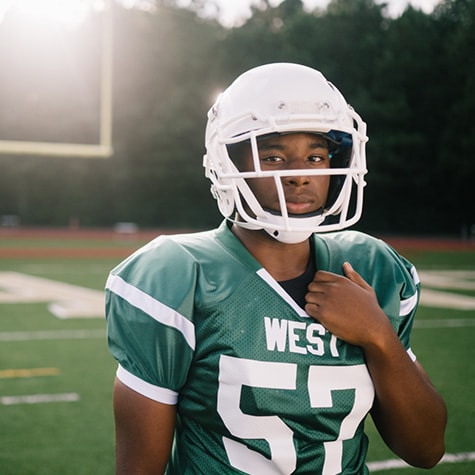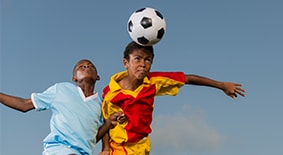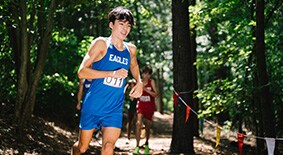Concussion Prevention in Kids and Teens
Concussion is one of the most common injuries among young athletes. Yet there are steps parents, coaches and athletes can take to help prevent this traumatic brain injury.
Concussions are a common brain injury that can occur after a hard hit to or near the head. While kids of all ages are at risk, young athletes playing soccer and football are more likely to suffer a concussion on the playing field.
For football players, concussions may result from helmet-to-helmet contact, improper tackling techniques, dangerous falls and running plays, among other causes.
For soccer players, concussions are most often caused by improper heading techniques or from head-to-head and arm-to-head contact. Collisions with other players on the field or being kicked in the head by a high kick or slide tackle can also lead to a concussion.
While there’s no way to prevent sports concussions entirely, parents, coaches and players can take steps to limit head injuries on the playing field and help ensure a concussion is addressed quickly and appropriately if it does occur.
“We encourage teen athletes to speak up about issues or symptoms they might be having, especially if they think they may have a concussion,” says Steve Kroll, MD, a Sports Medicine Primary Care Physician at Children’s Healthcare of Atlanta. “And keep in mind that a majority of the concussions we see are not the stereotypical ones where a football player is knocked out cold during a game, but the subtle injuries that initially go unnoticed.”
Increased concussion awareness among athletes, parents and coaches has helped reduce the incidence of long-term complications, as doctors can now properly treat and manage them.
“I often tell families, ‘It’s not as much about the injury as it is the proper management of the injury,’” adds Dr. Kroll.
How to prevent concussions in football
Football is one of the most high-impact sports a child can play, so it’s no surprise concussion is more common among young football players. However, an increase in concussion research and improved awareness has led to better concussion prevention measures for all athletes. In fact, all 50 states now have laws in place to improve prevention and treatment of traumatic brain injuries, like concussion, among athletes. Parents, coaches and players should all be well informed of concussion safety strategies before a player steps on the field:
- All safety and protective equipment should fit properly and be in good working condition.
- Young athletes should be taught proper heads-up tackling techniques, and those techniques should be enforced and practiced at all times.
- Avoid unnecessary helmet-to-helmet contact.
- Rules of safe play and sportsmanship should be enforced at all times by coaches and referees.
- If a player suffers a head injury, coaches and referees should remove the player from the game immediately for proper evaluation; players should not return to the field until they are cleared by a healthcare professional.
How to prevent concussions in soccer
U.S. Soccer has recently implemented new concussion guidelines for kids and teens as a way to keep young soccer players safe. These guidelines state that no child under the age of 10 should be heading the ball during practice or games. For athletes ages 11 to 13, heading should be limited to practice only.
When heading the ball:
- Lead with the trunk of the body, and pull from the core.
- Communicate clearly with other teammates and players to let them know you’re going for a header.
- Be confident and relaxed rather than stiff-bodied when going for the ball.
- Watch the ball at all times.
- Make contact with the ball with the “sweet spot” of your forehead—slightly beneath the hairline in the middle.
Check out proper heading techniques
Concussions can happen in any sport
It’s important to remember that concussions aren’t limited to just soccer and football. Regardless of which sport your child plays, players, coaches and parents should always be mindful of the following prevention strategies:
- Avoid head-to-head, arm-to-head or foot-to-head collisions with other athletes.
- Wear the right protective equipment for your sport, such as helmets, padding, shin guards, and eye and mouth guards.
- Protective equipment should fit properly, be well maintained, and be worn consistently and correctly.
- All rules of fair play and sportsmanship should be enforced by coaches and referees.
- If your child suffers a head injury, take her out of the game and have her evaluated by a physician.
Youth athletes aren’t the only kids at risk for concussion. Hard falls or bumps to the head are common causes of concussion in babies and toddlers.
“It’s important for parents to recognize the signs and symptoms of concussion, especially in younger children who may not be able to communicate how they’re feeling,” says Andrew Reisner, MD, a Pediatric Neurosurgeon and Medical Director of the Concussion Program at Children’s. “If a child is diagnosed with a concussion, then prevention becomes even more critical because kids who have had one concussion are more likely to have another one, which may be more severe.”
Preventing concussions in babies and toddlers
Parents should take the following steps to help keep young children safe at home and on the go:
- Don’t allow other children to carry your baby.
- Don’t leave your baby on a bed or couch.
- Don’t use baby walkers that have wheels, as these are prone to tipping.
- Always use safety straps on changing tables and in grocery carts and high chairs.
- Secure large pieces of furniture, such as bookshelves and TVs, to the floor or wall to prevent them from tipping over on your child.
- Make sure your child rides in an approved child safety seat or booster seat in the car.
- Keep windows and screens locked, or install safety guards to keep your child from falling out of them.
- Use safety gates at the top and bottom of stairs.
- Make sure the surface on your child’s playground is made of shock-absorbing material, such as hardwood mulch or sand.
Helmets can help prevent concussions
A helmet gives a child an added layer of protection against a traumatic brain injury. It’s not a guarantee that concussion won’t happen, but it is one way to help prevent the severity of a brain injury, especially when the right helmet is worn the right way during high-risk activities, including:
- Riding a bike, motorcycle, snowmobile, scooter or all-terrain vehicle (ATV).
- Playing a contact sport, such as football, ice hockey or boxing.
- Using in-line skates or riding a skateboard.
- Batting and running bases in baseball or softball.
- Riding a horse.
- Skiing or snowboarding.
If your child experiences a hit to the head—no matter how minor—keep a close watch for signs and symptoms of concussion. Reach out to your child’s doctor if you have any questions or concerns. You can never be too careful when it comes to a head injury.
More Tips to Keep Your Growing Athlete Safe

Help make sure your child receives the concussion care he needs.
At Children’s, we’re here to care for your child—so he can get back to being a kid. Our team is specially trained to care for concussions in kids and teens and can work with your child’s doctor to create a custom treatment plan.
Get AnswersSteve Kroll, MD, a Sports Medicine Primary Care Physician in the Sports Medicine Program at Children’s Healthcare of Atlanta, is board-certified in pediatrics and sports medicine. Dr. Kroll specializes in the diagnosis and treatment of sports-related injuries, nonoperative musculoskeletal injuries, overuse injuries and concussion management. Dr. Kroll is also a founding member of the Pediatric Research in Sports Medicine (PRiSM) organization. Early morning appointments are available with Dr. Kroll at our orthopedic and sports medicine clinic at Children’s at Meridian Mark.
This content is general information and is not specific medical advice. Always consult with a doctor or healthcare provider if you have any questions or concerns about the health of a child. In case of an urgent concern or emergency, call 911 or go to the nearest emergency department right away. Some physicians and affiliated healthcare professionals on the Children’s Healthcare of Atlanta team are independent providers and are not our employees.
Contact Us 404-785-KIDS (5437)


